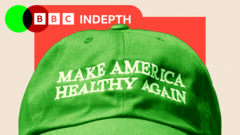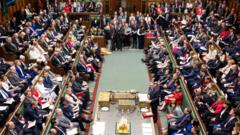Is RFK Jr's Make America Healthy Again Plan Fearmongering or a Game Changer?

Understanding Robert F. Kennedy Jr.'s Impact on U.S. Public Health
In a time when chronic illness rates are soaring and public trust in health institutions is waning, Robert F. Kennedy Jr. has stepped into the role of U.S. Health Secretary with a bold agenda. His approach is marked by the desire to address what he terms an "epidemic of chronic illness," which encompasses a wide range of health challenges, including obesity, diabetes, and heart disease. While his mission has garnered attention and support, it has also raised significant controversy, particularly due to his history of promoting health conspiracies. This article delves into Kennedy's initiatives, the public's response, and the broader implications for American health policy.
The Chronic Illness Epidemic in the U.S.
Kennedy's assertion that the U.S. faces an epidemic of chronic illness resonates with many healthcare experts who point to alarming statistics. According to the Centers for Disease Control and Prevention (CDC), nearly 60% of adults in the U.S. live with at least one chronic condition, and many struggle with multiple health issues. This situation underscores the importance of a comprehensive approach to public health that addresses not only symptoms but the underlying causes of these illnesses.
Chronic Illness Statistics
- Over 34 million Americans have diabetes.
- More than 42% of U.S. adults are classified as obese.
- Heart disease remains the leading cause of death in the U.S., affecting millions.
These figures highlight the urgent need for effective public health strategies. Kennedy's focus on chronic conditions aims to shift the national conversation towards prevention and holistic health solutions.
Kennedy's Controversial Background
While Kennedy's mission to tackle chronic illness may seem noble, his past has sparked skepticism among various health professionals. He is known for promoting unfounded conspiracy theories, including controversial claims about vaccines and environmental toxins. Critics have labeled him a "corruption fighter" with a tendency to veer into misinformation.
His history raises questions about the credibility of his initiatives. As he embarks on his agenda, it is essential to scrutinize the scientific basis for his policies and the potential ramifications for public health.
Targeting Food Additives
One of Kennedy's early actions as Health Secretary was to address the use of artificial food additives, particularly food colorings derived from petroleum. He has vowed to phase out these ingredients by the end of 2026, citing their potential link to hyperactivity in children and other health concerns. This initiative has garnered attention not only for its ambitious goals but also for the support it has received from some corners of the food industry.
The Role of the Food Industry
Major food corporations, like PepsiCo, have started to respond to Kennedy's pressure, announcing plans to eliminate artificial colors from their products. This shift reflects a growing awareness of consumer preferences for healthier, less processed foods. However, critics argue that these changes are merely surface-level adjustments that fail to address the systemic issues contributing to chronic illness.
Challenges in Food Regulation
- Many processed foods are still heavily subsidized, making unhealthy options more accessible.
- Marketing practices continue to target children, promoting junk food consumption.
- There is a lack of comprehensive policies that address food deserts and access to nutritious foods.
While Kennedy's focus on food additives is a step towards reform, it must be accompanied by broader dietary changes and structural reforms to truly impact public health.
Redefining U.S. Dietary Guidelines
Kennedy is also revising the U.S. national dietary guidelines, aiming to prioritize whole foods and reduce added sugars. This move is significant as these guidelines shape nutrition policies across various sectors, including school meals and programs for the elderly. By promoting healthier dietary choices, Kennedy aims to address some of the root causes of chronic illness.
Vaccination Policies and Controversy
Despite his focus on chronic illness and dietary reform, Kennedy's history as a vaccine skeptic complicates his role as Health Secretary. Vaccines have been heralded as one of the greatest public health achievements, preventing countless diseases and saving lives. However, Kennedy's activism has centered around questioning vaccine safety, a stance that has drawn ire from the medical community.
The Vaccine Debate
Kennedy's administration has taken controversial steps regarding vaccination policies, including dismissing members of an expert advisory panel and promoting research into discredited theories linking vaccines to autism. Critics warn that this shift could undermine decades of progress in public health and lead to reduced vaccination rates.
Implications for Public Health
- Increased skepticism around vaccines may lead to lower immunization rates, risking outbreaks of preventable diseases.
- Public health messaging may become fragmented, complicating efforts to promote vaccination.
- Shifts in policy could lead to regulatory changes that are not based on solid scientific evidence.
As Kennedy navigates these controversies, it is vital for public health officials to advocate for evidence-based practices that prioritize community health.
The Future of Public Health Under Kennedy
With Robert F. Kennedy Jr. at the helm of U.S. public health, the landscape is changing. His focus on chronic illness, food reform, and vaccine skepticism presents both opportunities and challenges. While he may invigorate discussions around neglected health issues, the effectiveness of his policies will depend on their scientific validity and the ability to foster public trust.
Key Considerations for the Future
- Balancing the need for reform with adherence to scientific guidelines is crucial for effective policy-making.
- Engaging communities in health initiatives can lead to more sustainable changes.
- Addressing structural barriers to health, such as poverty and access to nutritious foods, is essential for long-term success.
As Kennedy continues to implement his agenda, the healthcare community must remain vigilant, advocating for evidence-based policies that prioritize the well-being of all Americans.
Conclusion
Robert F. Kennedy Jr.'s appointment as U.S. Health Secretary is a pivotal moment for American public health. His ambitious agenda aims to tackle chronic illness and reform dietary guidelines, but his controversial history complicates his credibility. As the nation grapples with rising chronic disease rates and vaccine skepticism, the effectiveness of Kennedy's policies will ultimately shape the future of public health in the U.S. The coming years will reveal whether his approach can lead to meaningful, evidence-based change or if it risks further division within the healthcare landscape.
FAQs
What are Robert F. Kennedy Jr.'s main objectives as U.S. Health Secretary?
His primary objectives include addressing chronic illness, reforming dietary guidelines, and regulating harmful food additives.
What controversy surrounds Kennedy's views on vaccines?
Kennedy has a history of promoting vaccine skepticism and questioning their safety, which has raised concerns among public health experts.
How does Kennedy's approach to food additives impact public health?
By targeting harmful food additives, Kennedy aims to improve children's health and reduce the prevalence of chronic illnesses linked to processed foods.
As America continues to navigate the complexities of public health, the question remains: Can Robert F. Kennedy Jr. successfully balance his controversial views with the need for evidence-based health policies? #PublicHealth #ChronicIllness #HealthyAmerica
Published: 2025-06-30 23:12:10 | Category: technology



